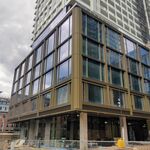Southcore
Active Member
Trailer for an upcoming documentary about the Toronto condo scene, which will air Nov 21st at 9 pm on CBC:
http://www.cbc.ca/doczone/episodes/the-condo-game
I'll hold back on commenting on it until it airs in its entirety, but you can certainly see the angle they are taking with it.
http://www.cbc.ca/doczone/episodes/the-condo-game
I'll hold back on commenting on it until it airs in its entirety, but you can certainly see the angle they are taking with it.
Last edited:




